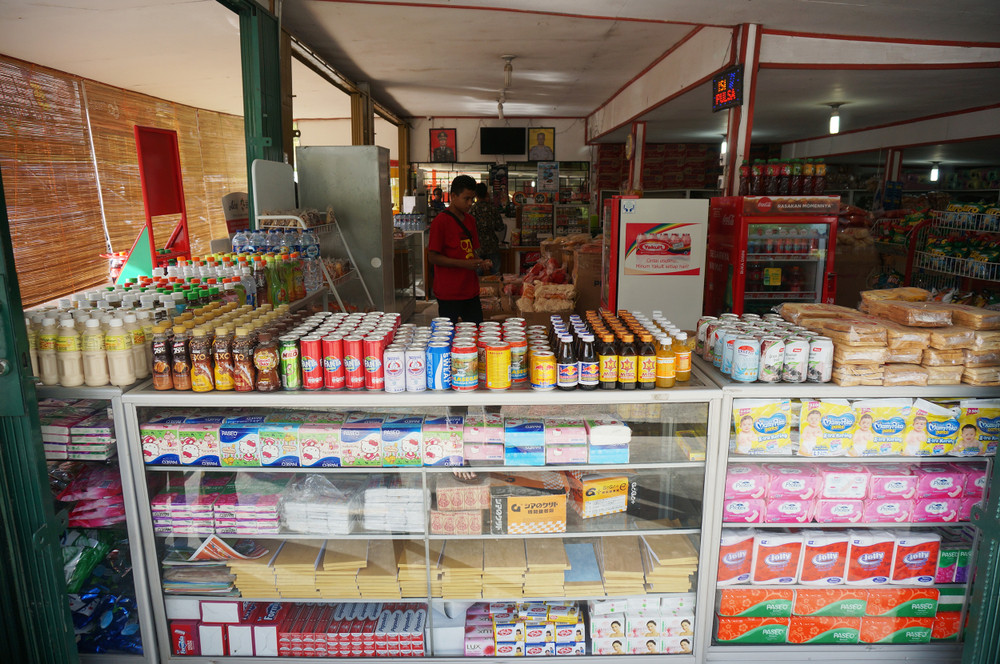Consumer goods competition gets tougher, but stocks remain attractive
Promises of wage increases and cash aid from the government next year buoy investors' hopes.
Change Size
 Mom-and-pop shop in Padang, West Sumatra. (Shutterstock/-)
Mom-and-pop shop in Padang, West Sumatra. (Shutterstock/-)
F
ast-moving consumer goods (FMCG) companies may continue to face challenges in 2019 amid slow consumption growth and new competing products, although there is potential for a rebound in their stock prices next year, analysts have predicted.
Some analysts forecast that the top-line growth of major FMCG players in Indonesia, such as Unilever Indonesia and Indofood CBP Sukses Makmur, would be unlikely to reach double digits in 2019.
“We only expect soft revenue growth [for Unilever] in 2019, an increase of 5.7 percent year-on-year [yoy],” said Natalia Sutanto, a Danareksa Sekuritas equity analyst, on her latest research note.
She said Unilever’s performance next year would face tight competition with new products from competitors coming onto the market, coupled with the possibility of a rupiah depreciation that may put pressure on margins.
In the first nine months of this year, Unilever Indonesia, listed on the bourse under the ticker code UNVR, posted only a 1 percent increase in revenues yoy to Rp 31.5 trillion (US$2.15 billion). Its profits rose by 39.7 percent to Rp 7.3 trillion as of September, thanks to a one-off gain from selling its spread business to KKR & Co. for $8.1 billion.
Unilever is not the only company that may encounter challenges next year, as analysts said Indofood Sukses Makmur’s subsidiary, Indofood ICBP – which sells flagship instant noodles Indomie, Supermi and Sarimi, dairy products and beverages like Indomilk and Pepsi – might see its margins squeezed next year.
“[For ICBP], there is a potential for a decline in margins because of the increase in prices of raw materials, especially wheat. Meanwhile, tight regulation, especially in the dairy industry recently, has also been our concern,” William Siregar, BNI Sekuritas equity analyst, told The Jakarta Post.
He said he expects ICPB’s revenues in 2019 to reach Rp 41.4 trillion, an increase of 8.95 percent compared to the estimated revenues of Rp 38 trillion, by the end of 2018.
Yet, there are some external factors that may support the performance of FMCG players in Indonesia, such as UNVR, ICBP, Kino Indonesia (KINO) and Garuda Food (GOOD) in 2019, which would make their stocks attractive for investors.
These factors are believed to drive consumption: the planned increase in workers' minimum wages by 8 percent in 2019, the rise in civil servants’ pay by 5 percent next year, the 100 percent increase in funds for the Family Hope Program (PKH) and the upcoming 2019 presidential election.
“Thus, going into 2019, we still set overweight ratings on shares in the FMCG sectors, based on those indicators,” William said.
Lanjar Nafi, an equity analyst from Reliance Sekuritas Indonesia, said that amid the slowdown in people’s purchasing power this year, the performances of UNVR, KINO, ICBP and GOOD were in line with expectations, although they were not that satisfactory.
Lanjar projects that UNVR’s top line will grow by 6.3 percent and its bottom line by 16.8 percent next year. In addition, he said he expects ICBP's topline to increase by 7.7 percent and bottom line by 8.2 percent, whereas he estimates KINO's topline to grow by 12 percent and bottom line by 15.9 percent.
KINO, which sells personal care products (Ellips, Ovale, Absolute), food and beverages (Cap Kaki Tiga, Cap Panda brands), said consumers’ purchasing power would remain soft until the beginning of December.
“Consumers’ purchasing power is still soft. Thus, as a company, we need to be more agile in capturing opportunities, including grabbing more market share from competitors,” Harry Sanusi, Kino president director, told the Post recently.
Helped with its personal care segment, Kino is optimistic that it would be able to book 12 percent revenue growth next year, without taking into account the food segment. Meanwhile, it aims to boost net profits by 30 percent in 2019.
Garudafood Putra Putri Jaya, producer of Gery, Kacang Garuda and Chocolatos, which had just launched an initial public offering (IPO) in October, said that to boost sales the firm would expand its business domestically and abroad. It would develop existing products and create new products to satisfy market demand.
“In 2018, we launched more than 10 new products and next year we plan to launch more than that to be able to win the competition in the market,” Hardianto Atmadja, Garudafood CEO, said.









